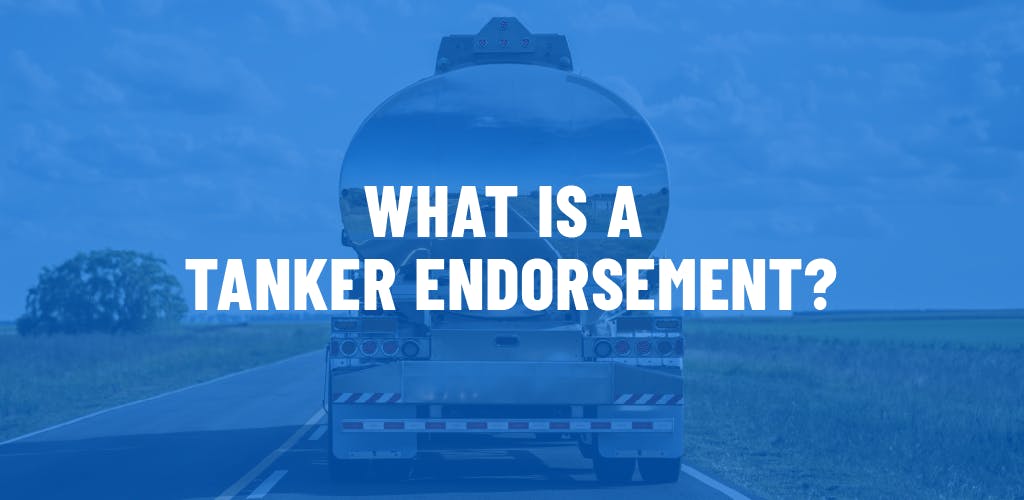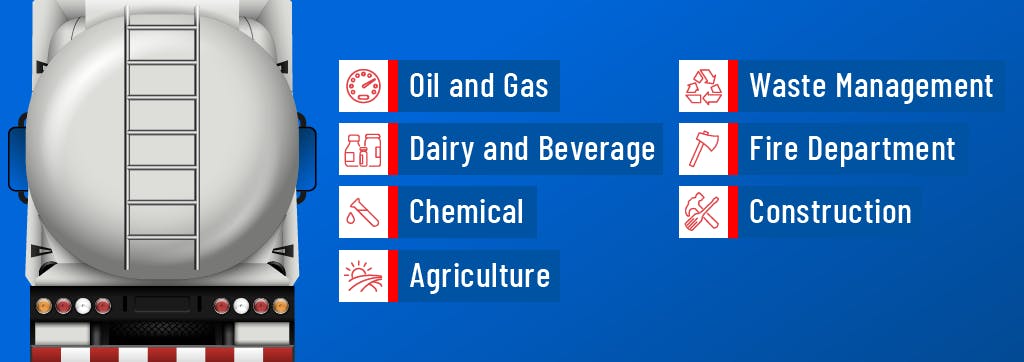What is a Tanker Endorsement?
October 26th, 2023

Not all drivers licenses are created equally and in the trucking world, there are different licenses for different jobs. The tanker endorsement is a crucial one, especially if you’re hauling liquid cargo.
Whether it’s milk or gasoline, transporting liquids comes with its own set of challenges. The weight can shift, and there’s always a risk of spills. The tanker endorsement ensures you’re trained to handle these situations, keeping the roads safe for everyone. In this article, we’ll break down what you need to know about this endorsement and why it’s essential for drivers in the liquid transport business.
The Importance of Tanker Endorsements
If you’ve ever spilled a soft drink while driving, then you know that transporting liquids can be a hazard. Now instead of a soft drink, imagine a tanker truck filled with thousands of gallons of water or gasoline making a sudden stop at a traffic light or navigating a sharp curve on a highway. You’ve seen that liquid inside doesn’t just stay still; it moves and sloshes around. When dealing in thousands of gallons, this movement, known as ‘liquid surge’, can throw the truck off balance, making it harder to control or even causing the rig to tip over.
Tanker trucks are more than just big containers on wheels though. They’re equipped with advanced technology designed to reduce the risk of tipping over due to the movement of liquid inside. Features like internal baffles help control the flow of liquid, preventing it from sloshing around too much. These baffles act as barriers within the tank, breaking up the space and reducing the wave effect of the liquid. This design helps keep the truck stable, especially during turns or sudden stops.
Technology alone isn’t enough. That’s where the tanker endorsement comes into play. This specialized training goes beyond the basics of driving a commercial vehicle. Drivers learn about the unique challenges of transporting liquids, from understanding the dynamics of how liquids move to mastering the techniques to control their vehicle under various conditions.
Imagine navigating a fully loaded tanker through hilly terrains or making tight turns in city traffic. The training covers scenarios like these and equips drivers with the knowledge to handle them safely. By the end of their training, drivers aren’t just certified; they’re experts in transporting liquid cargo safely and efficiently.
Who Needs a CDL Tanker Endorsement
Tanker endorsements aren’t necessary for every commercial driver, but Commercial Driver’s License (CDL) holders who operate vehicles designed to transport liquid cargo must obtain this certification. Irrespective of whether the liquid is hazardous like chemicals or non-hazardous like milk, the tanker endorsement certifies that the driver understands the unique challenges of transporting vast quantities of liquids on the road.
Industries and Job Roles Requiring a Tanker Endorsement:

- Oil and Gas Industry: Drivers transporting gasoline, diesel, and other fuels to gas stations or other distribution points.
- Dairy and Beverage Industry: Those transporting milk, juices, or other liquid beverages from production facilities to stores or distribution centers.
- Chemical Industry: Drivers responsible for moving liquid chemicals, solvents, or other hazardous materials.
- Agriculture: Transporting liquid fertilizers, pesticides, or water for irrigation.
- Waste Management: Drivers moving liquid waste or sewage.
- Fire Department: Fire truck drivers who operate vehicles equipped with large water tanks.
- Construction: Transporting liquid cement, tar, or other materials used in construction.
If you’re a CDL holder or aspiring to be one, and your job role aligns with any of the above, securing a tanker endorsement is not just beneficial—it’s mandatory.
Tanker Endorsement Requirements
To obtain a tanker endorsement, there are specific requirements and steps that drivers must follow:
- Age Requirement: Applicants must be 18 years of age or older.
- Residential Status: A valid USA passport or proof of valid residential status is required.
- State-specific CDL: If your CDL is from another state, it’s necessary to surrender the out-of-state CDL and obtain a new one for the state where you’re applying for the endorsement.
- Valid CDL: If you don’t currently hold a CDL, you’ll need to first obtain one before applying for the tanker endorsement.
- Eye Exam and Photo: An up-to-date eye exam is mandatory, and you’ll also need to take a current photo at the DMV.
- Fees: Be prepared to pay any associated application and training fees.
- Testing: You must pass both the tanker and hazardous material tests separately to obtain the endorsement.
- License Type: Only those with a Commercial Class B or Class A license can add a Tank Vehicle Endorsement.
- Hazardous Material Endorsement (HME): If you’re aiming for the HME, you’ll need to pass the HME knowledge test. If you already possess an HME, no longer require one, or don’t qualify for one, this should be specified in the DMV forms you submit.
How to Get a Tanker Endorsement
Navigating the process of obtaining a tanker endorsement requires a methodical approach. Here’s a step-by-step guide to ensure you cover all the bases:
1. Determine Your Eligibility:
- Ensure you’re at least 18 years old.
- Hold a valid USA passport or have a valid residential status.
- If your CDL is from another state, you’ll need to surrender it and apply for a CDL in your current state.
2. Apply for a CDL (if you don’t have one):
- Before you can get a tanker endorsement, you need a valid Commercial Driver’s License (CDL). If you don’t have one, start this process first.
3. Schedule an Appointment at Your State’s DMV:
- It’s always a good idea to book an appointment to avoid long wait times.
4. Choose the Right Endorsement:
- N Endorsement: This is required if you plan to haul containers of liquid or gaseous individual containers of greater than 119 gallons, loaded containers, and a combined volume of 1,000 gallons of liquid or gaseous materials.
- X Endorsement: This combines the traditional tanker endorsement (N Endorsement) with a hazmat endorsement. If you’re considering transporting hazardous materials in a tanker, this is the endorsement you’ll need.
5. Prepare for the Knowledge Test:
- Study the specific sections of your state’s CDL manual that cover tanker operations and safety. This will prepare you for the knowledge test.
6. Take the Knowledge Test:
- Head to your state’s DMV and take the tanker endorsement knowledge test.
7. Pay the Necessary Fees:
- There will be application and testing fees associated with obtaining your endorsement. Fees typically cost between $10 and $50 depending on your state.
8. Receive Your Endorsement:
- Once you’ve passed the knowledge test and paid all fees, you’ll receive your tanker endorsement. It will be added to your CDL, indicating that you’re qualified to drive tank vehicles.
9. Keep Up to Date:
- Remember, endorsements, like licenses, may have expiration dates or changes to requirements. Stay informed about any such requirements by checking resources like the Hale Trailer blog for for the latest.
Overview of the Tanker Endorsement Test
For those aiming to transport significant quantities of liquid or gas, the tanker endorsement test is a crucial step. Specifically designed for individuals who wish to transport 1,000 gallons or more of non-hazardous liquid or gas, this endorsement is applicable to all classes of the Commercial Driver’s License (CDL).
Test Format:
- Number of Questions: While the exact number might vary slightly depending on the state, the test typically consists of around 20 multiple-choice questions.
- Passing Score: To successfully obtain the endorsement, candidates must score an 80% or higher.
Key Topics Covered:
The test is designed to assess a driver’s knowledge and understanding of the unique challenges and safety protocols associated with transporting liquids in large quantities. Here are the primary topics you’ll encounter:
- Inspecting Tank Vehicles: This section delves into the specifics of checking tank vehicles to ensure they’re roadworthy and safe for transporting liquids.
- Driving Tank Vehicles: Given the unique dynamics of driving a vehicle filled with liquid, this section covers best practices and safety precautions.
- Safe Driving Rules: Beyond the specifics of tank vehicles, the test also reinforces general safe driving rules to ensure overall road safety.
While the format is generally consistent, always check with your specific state’s guidelines to be fully informed and ready for the test.
FAQ
Do Canadian drivers need tanker endorsement?
Canadian drivers who wish to operate tankers in the U.S. will need to obtain a U.S. tanker endorsement. The requirements might vary, so it’s essential to check with the appropriate U.S. authorities.
What are the main requirements of endorsement?
The primary requirements include being of the appropriate age, holding a valid CDL, undergoing specialized training, and passing the tanker endorsement test.
What endorsements are required for tankers?
Apart from the tanker endorsement, drivers might also need a Hazardous Materials (HazMat) endorsement if they transport hazardous liquids.
Learn More with Hale Trailer
At Hale Trailer, we’re more than just a trailer provider. We’re a resource hub for the trucking community. Whether you’re a seasoned driver or just starting, understanding endorsements and other industry requirements is crucial. Dive deeper into the world of transportation with Hale Trailer. Explore our extensive trailer inventory or visit us in a Hale Trailer location near you. We’re here to support your journey every step of the way.
All the information on this website – https://www.haletrailer.com – is published in good faith and for general information purposes only. Hale Trailer Brake and Wheel does not make any warranties about the completeness, reliability and accuracy of this information. Any action you take upon the information you find on this website, is strictly at your own risk. Hale Trailer Brake and Wheel will not be liable for any losses and/or damages in connection with the use of our website.
